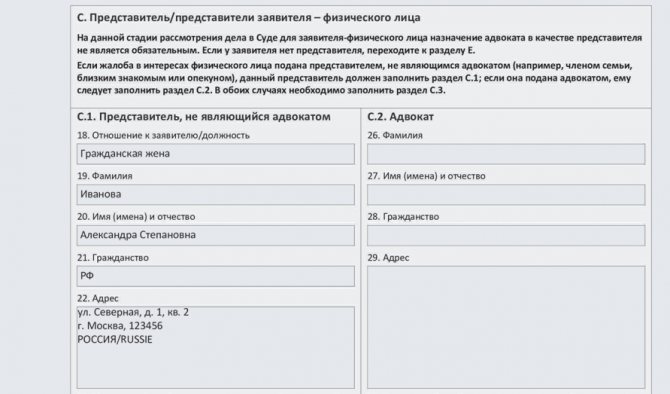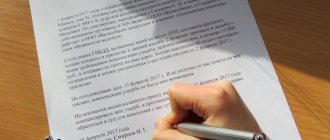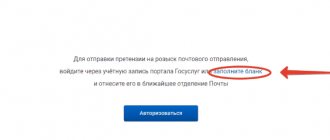Before proceeding to present issues related to filing a complaint with the European Court of Human Rights (ECtHR), it should be clarified that on December 15, 2020, the President of the Russian Federation signed a law allowing the Constitutional Court of the Russian Federation to partially or completely ignore decisions of the ECtHR. Files in .DOC: Form of complaint to the European Court of Human RightsSample complaint to the European Court of Human Rights
This, in essence, legalized the state’s refusal to implement certain decisions of the ECHR that contradict the provisions of the Constitution of the Russian Federation. At the same time, the Constitutional Court was delegated the right to review its own decisions if they contradict the decision of the ECHR.
Grounds for applying to the ECHR
The first and main justification for the right to appeal to the ECHR is the fact that the Russian Federation signed an agreement by which it recognized the supremacy of ECHR decisions over its own acts.
Among other things, the supremacy of decisions of international structures to which the Russian Federation has joined is a constitutional provision. This means that any decision of an international body, be it the UN, PACE or the ECHR, will have an advantage over the internal norms of the country.
There are many interpretations of the reasons why a citizen of the Russian Federation can appeal to the ECHR. The interpretations are confusing and, by and large, unnecessary for the average citizen.
Therefore, let's say briefly - a citizen has the right to appeal to the European Court of Human Rights if his rights, enshrined in the International Convention on Human Rights of September 3, 1953 and its protocols, were infringed by executive, legislative or judicial authorities.
The bulk of appeals to the ECHR are related to decisions and sentences passed by Russian courts, and the complaint is filed by a person who has suffered as a result of these decisions or sentences. Accordingly, when applying to the ECHR, this person receives the status of a victim.
Let us clarify that at the moment the Russian Federation has ratified almost all the protocols of the International Convention on Human Rights. Only the following remain unratified:
- Protocol No. 6 concerning restrictions on the use of the death penalty;
- Protocol No. 12 concerning measures to prevent discrimination;
- Protocol No. 13 concerning the total prohibition of the death penalty;
- Protocol No. 16 concerning the procedure for consultations between national courts and the ECHR.
That is, citizens of the Russian Federation cannot apply to the ECHR for the above reasons.
If your dispute with the legislative, executive or judicial authorities concerns the protocols listed below, then appealing to the ECHR is not limited to anything:
- Protocol No. 1 on state violations of the human right to property;
- Protocol No. 2 on state violations of the human right to education;
- Protocol No. 3 on state violations of the human right to free elections;
- Protocol No. 5 on violations by the state of the right to freedom of movement, the right not to be deported and imprisoned for debt;
- Protocol No. 7 on state violations of the rights of foreigners and families, as well as on human rights to compensation for false and unfair accusations.
A secondary factor in the validity of going to court is procedural issues. It is impossible to appeal to the ECHR if all the appeals have not been completed, namely:
- appeal;
- first cassation;
- second cassation;
- supervisory complaint.
Only after the Supreme Court of the Russian Federation has spoken on the merits of the dispute, will it be possible to refer the dispute to the ECHR.
Sample complaint to the European Court of Human Rights
Sample application to the European Court of Human Rights.
Sample application to the European Court of Human Rights (form)
EUROPEAN COURT OF HUMAN RIGHTS Council of Europe Strasbourg, France APPLICATION under Article 34 of the European Convention on Human Rights and Articles 45 and 47 of the Rules of Court
I. Parties
A. Applicant (indicate the following information about the applicant or his/her representative):
1. Last name of the applicant: ________________________________________ 2. First name, patronymic: __________________________________________ 3. Citizenship: __________________________________________ 4. Occupation: ___________________________________________ 5. Date and place of birth: _________________________________ 6. Permanent address: _____________________________________ 7. Telephone number: __________________________________________ 8. Address of the place where currently resides: ____________ ______________________________________________________________ 9. Last name, first name, patronymic of the representative: ____________________ 10. Occupation of the representative: ______________________________ 11. Address of the representative: ___________________________________ 12. Phone number of the representative: __________________________
B. High Contracting Party (indicate the name of the country against which the complaint is filed)
13. ______________________________________________________
II. Description of facts
14. ______________________________________________________ _________________________________________________________ _________________________________________________________
III. Description of the alleged violations of the provisions of the Convention and presentation of the corresponding arguments
15. _________________________________________________________ _________________________________________________________ _________________________________________________________ _________________________________________________________
IV. Compliance with the provisions of Art. 35 of the Convention (confirmation of the conditions for admissibility of the application)
____________________________________________________________ ____________________________________________________________
16. Final decision (date, court or other authority, nature of the decision)6: ____________________________________________________________ ____________________________________________________________ 17. Other decisions (list in chronological order; dates of these decisions; courts or other authorities; nature of all decisions mentioned): ____________________________________________________________ ____________________________________________________________ 18. Are there any other authorities that you could have contacted but did not do so, or other measures that you did not use? If yes, then explain why you did not contact these authorities or use these measures: ____________________________________________________________ ____________________________________________________________
V. Purpose of the complaint and general requirements for just satisfaction
19. ____________________________________________________________ ____________________________________________________________ ____________________________________________________________
VI. Filing complaints to other international authorities
20. Have you submitted applications to any other bodies of international investigation and settlement? If yes, please provide all details: ____________________________________________________________ ____________________________________________________________ ____________________________________________________________
VII. List of documents
(Attach copies of all decisions in your case. If you do not have a copy, you should obtain them. If you are unable to obtain copies, please tell us why. Documents you send will not be returned.) 21. a) ____________________________________________ c) ____________________________________________ With) ____________________________________________
VIII. Language in which you prefer to communicate
22. I prefer to receive decisions of the European Court in English/French (cross out the answer that is not required).
IX. Declaration and signature
23. I hereby confirm that, to the best of my knowledge and belief, all the information I have provided in the complaint is accurate and undertake to respect the confidentiality of the complaints mechanism of the European Court. 24. It is hereby confirmed that the applicant has no objection to his name being published publicly. If the applicant has such objections, it is necessary to indicate this here, stating his objections clearly and unambiguously.
Country and city _________________________
Date ___________
Signature of the applicant or his/her representative ______________________________
6 A complaint will not be considered admissible if it is filed more than six months from the date of the final domestic decision (for example, from the date of the cassation decision).
Difficulties of registration
On our website we try to provide the most reliable and truthful information. Therefore, we are obliged to say that you will not be able to prepare documents for the ECHR on your own, since the ECHR has extremely high requirements regarding the admissibility of cases for consideration. You will need advice from not just a lawyer, but a lawyer who specializes in appeals to the ECHR and is able to represent your interests there.
Of course, as part of this article we will provide a sample complaint to the ECHR, but this sample will only help you get some idea of the essence of the problem and allow you to critically evaluate the abilities of a particular lawyer who will offer you his services in drawing up a complaint.
Thanks to the ECHR regulations, a citizen of a PACE member country has the right to apply to court in the language of his country. For citizens of Russia, therefore, there is the possibility of applying in Russian. To do this they will need:
- fill out a unified application form;
- power of attorney for a representative in the ECHR;
- documents related to the essence of the appeal (court decisions, appellate decisions, etc.);
- summary table of personal data of persons applying to the ECHR, if there are more than 5 of them;
- other documents or explanations that may be requested by the ECHR Secretariat. If the requested data is not provided within 6 months, the ECHR will terminate the proceedings.
There is no payment for the consideration of the case. An appeal against the actions of executive, legislative or judicial authorities can only take place within six months from the date of the decision of the last instance in which the actions of the authorities were appealed.
I’m still not sure whether I should contact the ECHR, will they help me there?
Often the ECHR is the last opportunity to achieve justice even in the most complex, hopeless cases that ended in failure in Russian courts. However, you should take a pragmatic approach to applying there - assess your chances in advance, correctly draw up a complaint and other documents, collect and provide evidence.
We recommend watching a video about the European Court of Human Rights (in Russian).
Didn't find the answer to your question here? Write to us, we will be happy to help you.
Method of treatment
The completed form and all necessary documents are sent to the ECHR only by post to the address:
The Registrar European Court of Human Rights Council of Europe 67075 STRASBOURG CEDEX FRANCE
Sending by email or fax is not permitted. The form is sent in the original with the original signatures of the “victim” and his representative. Documents are sent either in original or notarized with subsequent legalization.
Having received the form and documents, the ECHR Secretariat will check the correctness of completion and completeness of the applications. The entire procedure for registering, sending and verifying an appeal is contained in Art. 471 of the ECHR Rules.
So, in accordance with this article, the form indicates:
- full name, date of birth, nationality, gender, occupation and address of the victim;
- the full name, occupation and address of the victim's representative (if he will participate in the proceedings);
- the name of the country against which the complaint is being made;
- a brief summary of the event that became the basis for the application to the ECHR;
- a summary and argumentation of violations of the International Convention on Human Rights by the state in connection with this event;
- assurance that all national appeals have been completed;
- assurance that the subject of the dispute has not previously been the subject of consideration in the ECHR (Article 35 of the Convention for the Protection of Human Rights and Fundamental Freedoms);
- assurance that the damage caused by the authorities is significant (Article 35 of the Convention for the Protection of Human Rights and Fundamental Freedoms);
- information that the last decision of the national authority took place no more than 6 months ago (Article 35 of the Convention for the Protection of Human Rights and Fundamental Freedoms);
- subject of the complaint.

The completeness of the attachments to the form is assessed by the Secretariat based on what documents are attached to the complaint. Thus, the following must be attached:
- originals or certified and legalized copies of all documents related to the complaint, for example, decisions of the courts of the first, second, third and supervisory instances;
- documents confirming in one way or another the conditions for the admissibility of the complaint, that is, confirming compliance with the six-month deadline for filing;
- If the applicant has addressed the dispute to other international authorities, information about this will also be required.
Please note that if the Secretariat of the ECHR considers your application not subject to consideration, then the file with your application and all documents attached to it will remain in the archives of the ECHR. Therefore, we recommend sending not original documents, but their copies.
What complaints does the ECHR consider?
Only after the ECHR receives a fully completed form with all supporting documents will a dossier be created in which correspondence with you and documents will be stored.
Upon receipt of your form, the ECHR Registry will check whether it contains all the necessary information and whether all documents are attached. If the required information or documents are missing, you will receive a letter stating that the requirements of Article 47 of the ECHR Rules have not been met, that the file on your complaint has not been opened and that the documents you sent will not be retained. In this case, you can file a complaint again: this means that you need to send the completed form and all the necessary documents and decisions to the ECHR, even if you previously sent some of them. An incomplete package of documents will not be accepted for consideration.
The Registry cannot provide you with information about the laws of the State against which you are complaining, nor can you provide legal advice on the application and interpretation of national law.
Before sending a complaint to the ECHR, make a copy of the completed form and save the original documents. Thus, if the Registry notifies you that your application is incomplete, you can, if you wish, easily and quickly submit a new, properly completed application to the ECtHR. The ECtHR cannot guarantee that if an incomplete application is refused, you will have enough time to re-file the application before the six-month period expires. Therefore, you must do everything necessary to send the full application form to the ECtHR in advance, along with all required supporting documents.
If the complaint form is completely completed, the Registry may notify you that a complaint file has been opened in your name, the number of which you must refer to in all subsequent correspondence with the ECtHR. You will also be sent a set of barcode stickers, which you will be required to affix to all subsequent letters to the ECHR.
The Secretariat may also request additional information or clarification from you. It is in your best interest to respond to all letters from the Secretariat as quickly as possible, because if no response is received for more than six months, the complaint file will be destroyed. In addition, please note that even after the complaint has been accepted for proceedings, any delay in responding to the Secretariat’s letter or lack of response, as well as failure to provide additional information or documents at the request of the ECtHR, may be regarded as a loss of interest on the part of the applicant in the process of consideration of his complaint. This may lead to the ECtHR not considering the complaint, deeming it inadmissible, or removing it from the list of cases.
Correct description of the subject of the complaint to the ECHR
The subject of the complaint is the information that constitutes the essence of the appeal, that is, the violation of human rights from which the applicant suffered.
The main principle of describing an item is brevity. There is no need to cite excerpts from a court decision or from a decision of the mayor's office. The ECHR judges will independently read the copies of court decisions you have attached.
A separate field is provided in the form to state the subject of the complaint, and all information will need to be included in it. Going out of bounds will be grounds for refusal to accept the complaint.
If it is impossible to fit into the field and the subject requires explanation, then the explanations can be stated in an additional appendix to the form, and the volume of this addition cannot exceed 20 sheets. Let us repeat that in the application you can only write explanations for the information that is included in the main field of the form. The application is compiled according to the following rules:
- printed font size 12 for text and size 10 for footnotes;
- mandatory numbering of sheets;
- A4 sheet size;
- margins up to 3.5;
- numbering of paragraphs.








